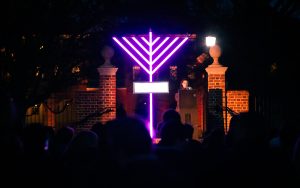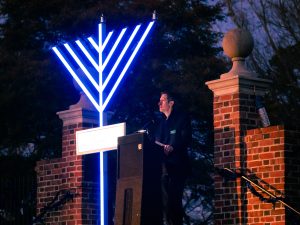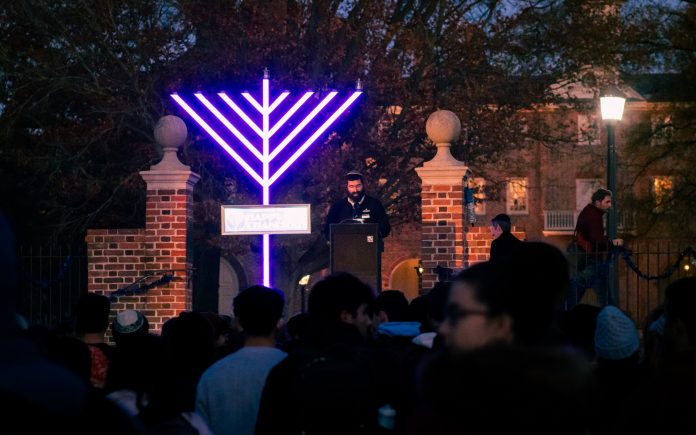In early December, the Second Sundays Art and Music Festival, presented by the 501c3 non-profit organization LoveLight Placemaking, rejected Chabad Williamsburg Rabbi Mendy Heber’s proposal for a Hanukkah menorah lighting during its Dec. 10 street fair in Williamsburg, Va.
Several local and national news outlets publicized messages regarding the menorah lighting between Heber and Second Sundays organizer and leader of LoveLight Placemaking Shirley Vermillion. In the exchange, Vermillion expressed concern over whether the proposed menorah lighting would appear as “choosing a side” in the conflict between Israel and Palestine. This exchange led to an outcry of accusations of antisemitism and bigotry against the festival.
“I thought it was very, very appropriate to have a menorah lighting by the festival because the festival stands for peace, love and light. And a menorah stands for peace, love and light, too,” Heber said.
“I thought it was very, very appropriate to have a menorah lighting by the festival because the festival stands for peace, love and light. And a menorah stands for peace, love and light, too,” Heber said.
The United Jewish Community of the Virginia Peninsula provided screenshots of the direct message exchange between Heber and Vermillion to the Williamsburg-Yorktown Daily and other local news outlets.
“We are about Love & light…don’t want to make it seem we’re choosing a side – supporting the killing/bombing of thousands of men, women & children,” Vermillion wrote in the original direct message exchange with Heber. “I am so busy with life & 2nd sundays & choose to steer clear of the news…was mostly unaware of ‘details’ of the war…I’ve steered clear of letting a specific church or religion seeming to be supported by LoveLight & 2nd Sundays – need to stay on that course.”
Heber’s response to Vermillion mentioned that the celebration of Hanukkah would not be related to events in Israel or be a commentary on Zionism. Vermillion responded that the festival’s board would only be comfortable with the celebration if it was done under a banner calling for a ceasefire.
“So, clearly, they were ready to move forward with the menorah lighting under certain circumstances, which is very hurtful. To give American Jewry a litmus test of, to take a political side in what’s going on in Israel, is un-American,” Heber said in an interview with The Flat Hat.
He continued, noting that the wording discrepancy between a cancellation of the menorah lighting or a refusal of the proposed menorah lighting is not what matters to him. Instead, the event board’s reasoning for its decision is more important to Heber.
“The Jewish community is upset because you have a right to say that it’s not going to work out scheduling-wise, and that’s fine, but you don’t have a right to say that you’re going to have to choose a political side in a war that Israel is going through,” Heber said. “Now, don’t get me wrong, Jewish people have very strong opinions on what should and shouldn’t happen in Israel. It’s beyond the scope of this conversation and beyond the scope of Hanukkah and the message of Hanukkah. And for you to mix the two together is un-American. It’s ironic.”
Heber has regularly participated in the Second Sundays festival on the vendor side, selling Challah bread with his wife Esther as part of the Chabad Williamsburg not-for-profit.
As word of the refusal spread, the United Jewish Community of the Virginia Peninsula contacted Vermillion and released an official statement on Dec. 3.

“We should be very clear: it is antisemitic to hold Jews collectively responsible for Israel’s policies and actions, and to require a political litmus test for Jews’ participation in community events that have nothing to do with Israel,” the United Jewish Community of the Virginia Peninsula statement reads.
The statement also said that the decision by Second Sundays contradicted the festival’s own values.
“The Second Sundays Art & Music Festival has been a meaningful and important community event that brings people together under a powerful message of unity, love and light. Excluding Jewish participation from a festival that should welcome everyone undermines its very message,” the United Jewish Community of the Virginia Peninsula statement reads.
In an email to The Flat Hat, Vermillion wrote that Second Sundays’s board did not approve Heber’s proposed menorah lighting or Hanukkah gelt drop in an attempt to remain religiously neutral.
“Our Festival has remained religious & culturally neutral for 14 years, and we decided to stick to that path,” Vermillion wrote. “We’ve never had Christmas Trees or any other kind of decorations, we’ve always referred to our Nov & Dec events as Holiday Markets – not Christmas markets and have always sought to add artisans that create art appropriate for all cultures, faiths & religious preferences.”
President of the College’s Hillel Lilly Tanenbaum ’25 mentioned that she was surprised Second Sundays did not proceed with the menorah lighting.
“Asking a Jewish group to qualify an event that is religious with a political opinion is not okay,” Tanenbaum said. “I really hope that we can maintain a separation between Jewish events and political events for the sake of students on campus.”
“Asking a Jewish group to qualify an event that is religious with a political opinion is not okay,” Tanenbaum said. “I really hope that we can maintain a separation between Jewish events and political events for the sake of students on campus.”
Tanenbaum also expressed that the controversy around the event made concerns over increased antisemitism feel uncomfortably close to home.
“I think often when any issue happens, antisemitism or any national issue, something that makes you feel safe is just the fact that it’s not exactly where you are. And I think this was kind of that bubble coming down,” Tanenbaum said.
In a Dec. 6 joint statement from the College’s Students for Justice in Palestine and Jewish Voices for Peace, the two student organizations joined together to voice their concerns over the implications of Second Sundays’s decision. The organizations called for Second Sundays to reconsider and allow the menorah lighting to occur.
“We come together as two concerned organizations to address Second Sunday’s conflation of Zionism and Judaism through their decision on the proposed menorah lighting at this year’s Art and Music Festival,” the joint SJP and JVP statement reads. “We believe making the menorah lighting contingent on the posting of a ceasefire banner is an ill-informed decision, as it very clearly implies Jewish individuals must clarify they are anti-genocide in order to participate in a religious tradition. The religion of Judaism and the State of Israel are separate and distinct entities entirely, and to conflate the traditions and people of the former with the actions of the latter by pausing a religious observance blurs the line between them and implies the Jewish faith is inseparable from Zionism, a view that is inherently antisemitic.”
Ben Frogel ’25, the student president of the College’s Chabad, also noted his frustration with the decision from Second Sundays to refuse to hold the menorah lighting.
“Personally, I was disappointed,” Frogel said. “I really hate to see a celebration of Jewish unity be construed as something that was going to be taking an explicit stand and then be canceled as such.”
Dec. 4, Va. Governor Glenn Youngkin posted on X condemning the decision from Second Sundays.
“Singling out the Jewish community by canceling this Hanukkah celebration is absurd and antisemitic,” Youngkin wrote in the post. “The event organizers should immediately reconsider their actions and move forward with the menorah lighting.”
In the face of increasing criticism and concern, Vermillion voiced frustration with the press this decision has received in the media.
“I am so sorry for all of the horrible misunderstandings surrounding this, including all of the awful accusations about our non-profit, our festival, me, the artists & musicians that we work with and our town- nothing could be further from the truth as I know how I’ve worked for 14 years to be inclusive,” Vermillion wrote in an email to The Flat Hat.
President of the College’s Tau Pi chapter of the Alpha Epsilon Pi fraternity Jacob Goldberg ’25 also expressed his disappointment regarding the decision.
“I think it is sad that the organizers of Second Sunday chose to conflate our religious celebration with a political activity,” Goldberg said. “Hanukkah is not a political event at all. The menorah lighting would have been a celebration of the holiday, which is something that’s important to Jewish people.”
Dec. 8, Second Sundays announced on their Instagram account that they were cancelling the festival scheduled for Dec. 10 due to the weather forecast.
Despite the Second Sundays menorah lighting refusal, Jewish organizations affiliated with the College proceeded with their own annual menorah lighting ceremony on the Sunken Garden. The celebration, which took place on the first night of Hanukkah on Dec. 7, was sponsored by Hillel, the College’s on-campus Chabad organization, and the Alpha Epsilon Pi fraternity.
Heber, Hillel Rabbi Gershon Litt, Tanenbaum and Chabad representative Andrew Finkelstein ’26 each gave brief speeches prior to the menorah lighting. Finkelstein began with a brief introduction to the history of Hanukkah.
“What is Hanukkah really about? The miracle in the physical realm of war teaches us to be like a Maccabee and bravely stand up for what we believe is right. The miracle in the spiritual realm of the menorah teaches us what we ought to stand up for — mitzvot. What better way to do that than with a symbol of spreading light,” Finkelstein said.
Litt followed by asking the audience of students, faculty and community members to embrace the purpose of the holiday.

“Tonight, on this island, in this Sunken Garden, we will light the candles of unity and pride,” Litt said. “Let us internalize the light of the menorah that we’re about to light. Let it penetrate our souls, illuminate those internal struggles that come to war inside of us in conflict. Rise up to the challenge that Hanukkah presents, to be a light for the rest of the Jewish people, to be a light in the William and Mary community, to be a light to the world.”
Tanenbaum then spoke about the Jewish concept of tikkun olam, or actions taken to repair the world. She emphasized the importance of performing these acts in order to restore light and fight against oppression, themes that Tanenbaum also pointed out in the story of Hanukkah.
“This event, to me, is not just a celebration of Hanukkah, but a celebration of Jewish celebration,” Tanenbaum said. “The prayers and customs we perform tonight are the same ones performed by our ancestors, many of whom could not celebrate openly as we do now but had to shroud their lights in darkness. This history is not just a call to fight against antisemitism; it is a call to fight against all forms of oppression, violence and hatred. Darkness does not discriminate. It affects millions of people of so many religions, races, sexualities and nationalities. And so we must make sure our light does not discriminate either.”
Before the speakers lit the menorah together, Williamsburg Mayor Doug Pons gave a brief speech to proclaim Dec. 7 as Menorah Illumination Day.
Heber noted his appreciation of the proclamation from Mayor Pons and of the support from other elected leaders like Youngkin. Heber attended Youngkin’s Hanukkah party on the seventh night of the holiday along with several other Jewish leaders across the state.
“When you see elected leaders calling out the truth for what it is, it’s very empowering and very hopeful that we can actually combat this in a normal and healthy way,” Heber said.
“When you see elected leaders calling out the truth for what it is, it’s very empowering and very hopeful that we can actually combat this in a normal and healthy way,” Heber said.
Former President of the College’s Hillel Sam Rubin ’24 attended the Campus menorah lighting and spoke on the power and meaning behind the event, especially in light of Second Sunday’s refusal to hold their own separate menorah lighting.
“We are unequivocally and immensely proud to be here and to be showing our light on campus and literally illuminating Sunken Gardens,” Rubin said. “So it’s a powerful statement to make that the three largest Jewish organizations on campus came together and had this event in lieu of the Second Sundays events and the rise in antisemitism across the country.”
Rubin emphasized that the decision to hold the campus menorah lighting was made long before Second Sundays’s refusal and that the campus menorah lighting is an annual event to celebrate the meaning of Hanukkah and Jewish life at the College.
“There’s a very powerful statement in the Torah, it’s called Hineni or ‘Here I am,’ and it’s basically just putting yourself fully out there and saying like, ‘Here I am,’ me in my entirety, here is the Jewish life on campus, here is Jewish existence at William and Mary, here we are, like come look at us,” Rubin said. “We’re going to be proud, we’re going to sing, we’re going to pray, we’re going to light candles, we’re going to have all of this celebration of Jewish existence at this school.”
Goldberg reflected on the menorah lighting as a place for Jewish students and local residents to come together as a community.
“The reason we wanted to help co-sponsor is because we believe part of our mission is creating a place for a Jewish community on campus and helping bolster that, so we are happy to have helped provide a place for people to celebrate Hanukkah and a large community event,” Goldberg said. “The more events we have on campus to really bring all of the Jewish people together at school means a lot to me. And it’s always very nice to have that opportunity to celebrate with the wider community here and really feel like we have a place here.”
Tanenbaum echoed Goldberg’s statement by mentioning what the purpose of the holiday is to her.
“Hanukkah is a time that I’ve always been taught is just about bringing light to the world,” Tanenbaum said. “And that the light isn’t conditional on anything. I want it to be clear that I really want to help and fight for everyone. And it felt like an important time to make sure that campus understood that message and, you know, I consider my job to be on behalf of all the Jewish students and to make sure that this event hopefully made their life easier and not harder.”

